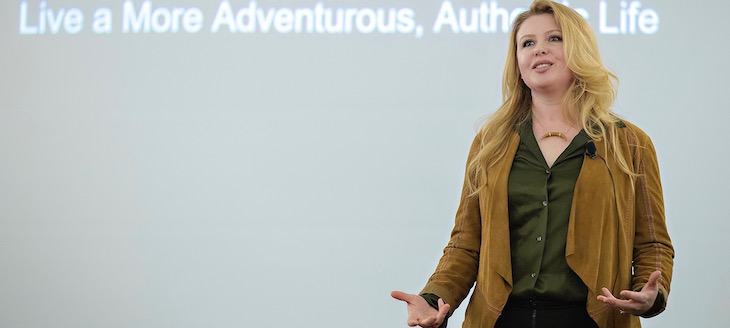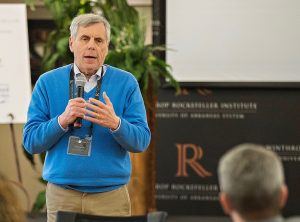Under 40 Forum participants asked to build a ‘Better Brand for Arkansas’
by April 5, 2018 5:17 pm 1,683 views

Author, outdoor adventure planner and speaker Georgia Pellegrini (photo courtesy of Wesley Hitt/WRI)
Author, outdoor adventure planner and speaker Georgia Pellegrini told Arkansas community and business leaders they have an “incredible opportunity” to help the state develop a brand, adding they should not depend on government institutions to “set the message” about the state.
The New York State native was Thursday’s (April 5) keynote speaker at the 3rd Annual Under 40 Forum held at the Winthrop Rockefeller Institute (WRI) on Petit Jean Mountain. The event was conducted by the WRI and the Clinton School of Public Service. The forum brought together the most recent Forty Under 40 class members selected by the Northwest Arkansas Business Journal and Arkansas Business in central Arkansas.
The forum was held Thursday and Friday, and the focus was “A Better Brand for Arkansas.”
“We will consider how we can build a better brand reputation for Arkansas by focusing on our challenges and assets and will seek positive steps to move from our current identity toward that better vision for tomorrow,” noted a joint letter to participants from Dr. Marta Loyd, WRI executive director, and Skip Rutherford, dean of the University of Arkansas Clinton School of Public Service.
Pellegrini, who makes frequent television appearances and has written three books, said she has spent 10 years touring Arkansas and bringing people to the state for “adventure getaways.” Based on her experiences, she told the forum participants Arkansas does not have a unifying, positive brand.
“Right now, Arkansas doesn’t send a message. It just doesn’t,” she said.
The lack of a message, however, presents an “incredible opportunity” for the group to begin the process of helping craft a message and brand.
“You are sitting on gold,” Pellegrini said of the state’s natural assets. “And right now, that’s being squandered.”
She was critical of the state’s tourism marketing efforts, saying the state is “playing it really safe,” in marketing primarily to nearby states. She said growth of the state’s tourism tax numbers in recent years “is not enough to create a profound” impact in terms of helping the overall state economy.
“I’m sick of hearing about bike trails. I’m sick of hearing about state parks,” Pellegrini said of some of the state’s tourism messaging.
In response to a question, Pellegrini said the private sector shouldn’t rely solely on state agencies to create a brand and associated messaging to best promote the state to the rest of the world.
Kane Webb, executive director of the Arkansas Department of Parks and Tourism, said the numbers show a successful tourism recruitment message. He also said the growing number of tourism events and facilities suggest more interest in Arkansas from out-of-state visitors.

“Revenues from the 2 percent tourism tax, perhaps the best barometer of travel to the state, are at record highs. Just last week, the Walton Family Foundation released a study that showed cycling and trails had a $137 million economic impact in Northwest Arkansas alone, including $27 million in spending at local businesses. The growth of the tourism and hospitality industry is evident across Arkansas – from El Dorado to Bentonville and points between – and I’m pleased with the way we continue to look for interesting ways to tell that story and get the word out,” Webb noted in a statement to Talk Business & Politics. “In general, with our use of aggressive new creative backed up by up-and-coming Arkansas musicians (not stock music like many states), influence bloggers, a media strategy based on research and innovation, and a website currently being redeveloped by one of the top digital firms and industry leaders in the country, I’d say we’re playing it pretty well. And the numbers reflect that.”
‘BIG CHALLENGES’
Prior to Pellegrini’s remarks, Loyd encouraged participants to “imagine an Arkansas” that is known around the world for its economic vitality and quality of place. Part of that process, she said, is to consider “natural collaborations” among people and institutions in the state that can help the state build a better brand.
Rutherford told the young leaders they are all “recruiters for the state,” and should approach the task of considering a better brand by thinking about what they hear from people who aren’t from the state. They also should consider how they represent Arkansas when traveling out of state, and should be able to talk about the state’s positive qualities.
“There is a lot that is right (with Arkansas),” Rutherford said.
But the state’s history – Little Rock Central High School crisis in 1957, for example – and its frequent low national ranking in key socioeconomic metrics have resulted in “big challenges even today” to better brand Arkansas outside the state.
The challenges are solvable, Pellegrini noted.
“Arkansas has a solvable (brand) problem, and you can be a part of the solution.”
THE REPORT
Loyd told forum participants the two days would have them “funnel down” all their ideas into a report that will be delivered to the governor and more than 200 business and political leaders around the state.
Forum participants in 2017 focused on solutions to “a fractured Arkansas.” An “aggressive and uncommon” approach to education, efforts toward boosting “cultural competency” and the need to push a rural state toward “demands of the modern economy” were some of the ideas in the 2017 Under 40 Forum report delivered May 30 to Gov. Asa Hutchinson.
“They noted that shifting demographics, technology and additional focus on education issues by disparate advocacy groups has provided innumerable paths to prosperity. Some regions, often the ones with more resources, seem to flourish,” the 2017 report noted in the section on education. “The vast amount of programs that are in operation across the state, coupled with the extraordinary amount of information presented to people daily, makes it difficult to keep up with what is working best. Add to that, what works best in Mena may not be what works best in Magnolia.”
